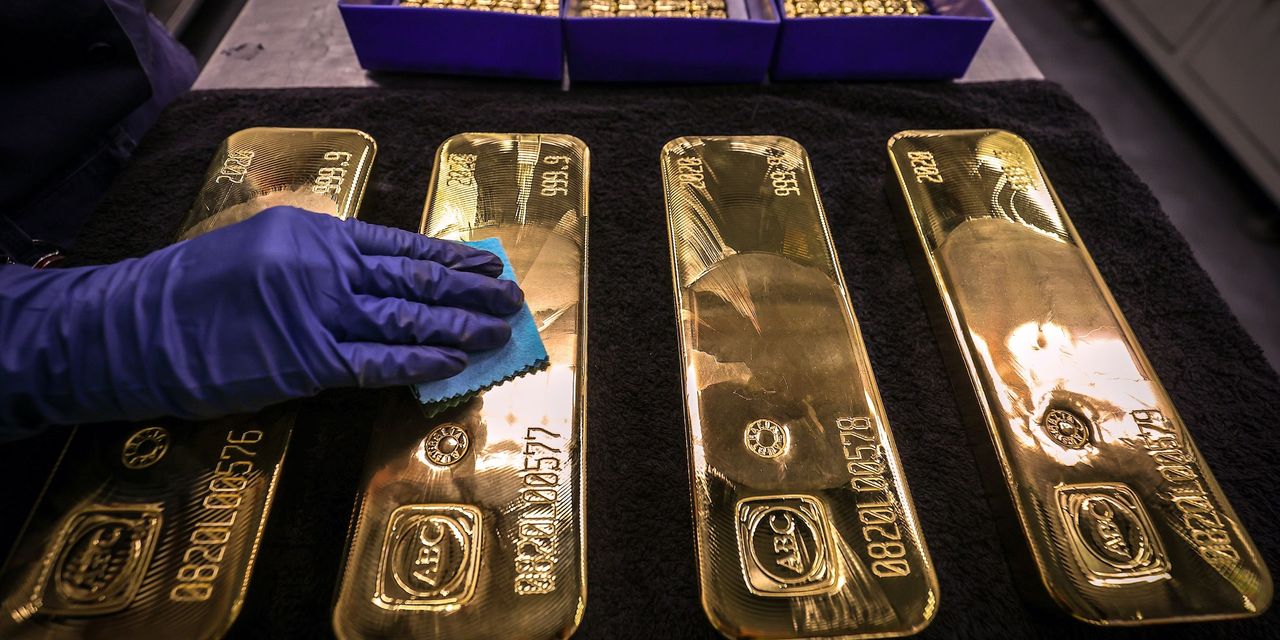Gold prices ended higher on Wednesday after rising for four straight sessions, then held the bulk of their gains after the Federal Reserve left its benchmark fed-funds rate unchanged, as expected.
Later this week, decisions are also expected from the Bank of Japan and Bank of England.
Market drivers
-
Gold for December delivery
GC00,
+0.27% GCZ23,
+0.27%
climbed by $13.40, or 0.7%, to settle at $1,967.10 per ounce on Comex. Prices settled higher for fifth session in a row, the longest daily streak of gains since January, according to Dow Jones Market Data. The most-active contract also notched another settlement at their highest since Sept. 1. It traded at $1,967.10 shortly after the Fed announcement. -
December silver
SI00,
+0.56% SIZ23,
+0.56%
gained 38 cents, or 1.6%, to $23.84 per ounce. -
October platinum
PLV23,
+0.93%
fell by $6.10, or 0.6%, to $942.30 per ounce, while December palladium
PAZ23,
-0.98%
added $14.80, or 1.2%, to $1,281.30 per ounce. -
Copper for December
HGZ23,
-0.05%
gained 3 cents, or 0.8%, to $3.78 per pound.
Market drivers
“Gold prices have been, at the very least, resilient, reflecting not only growing expectations of less aggressive Fed monetary policy but also of increased expectations of a ‘soft landing’,” said Jeff Klearman, portfolio manager at GraniteShares which runs the GraniteShares Gold Trust
BAR.
“A resilient economy with slowing inflation has tilted market sentiment that the Fed funds target rate has a decent chance of remaining unchanged in the near term,” he told MarketWatch. “All of this is supportive of gold prices going forward.”
Gold futures are trading higher for the week and for the year so far, they but have fallen for the month and quarter to date.
The bond market, meanwhile, has “clearly bought the Fed’s threat of ‘higher for longer,’ with all short- and mid-dated U.S. Treasury yields ending Tuesday at fresh 16-year highs,” Adrian Ash, director of research at BullionVault, told MarketWatch, ahead of Wednesday’s Fed announcement.
Still, “gold refuses to fall, edging higher in all currencies and defying the higher rate of return offered to cash as the appeal of investment insurance grows on the risk of a Fed mistake, raising rates too far too late for the economy to bear,” he said.
Inflation concerns, however, do still exist, said GraniteShares’ Klearman. That’s “mainly due to the recent increase in oil prices, adding to uncertainty regarding future Fed monetary policy,” he said.
Rising oil prices may be considered as a factor acting to slow economic growth and, as a result, cause the Fed to be “more tolerant of short-term increases in inflation…and proceed with caution,” said Klearman. “This caution would be added to the already existing concerns of the possible harmful effects of raising rates too much. Again, supportive of gold prices going forward.”
Read the full article here






